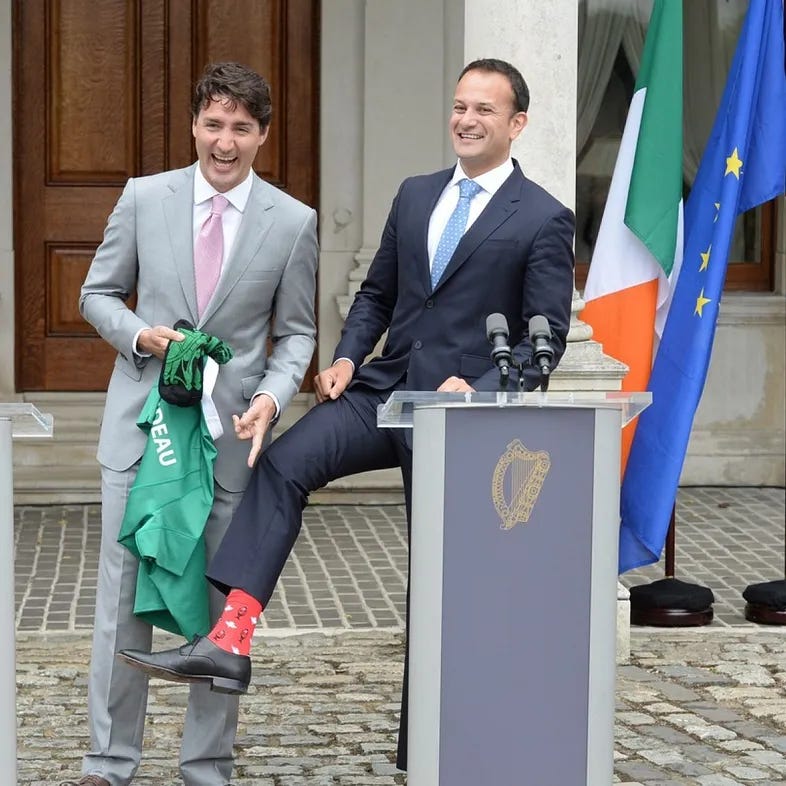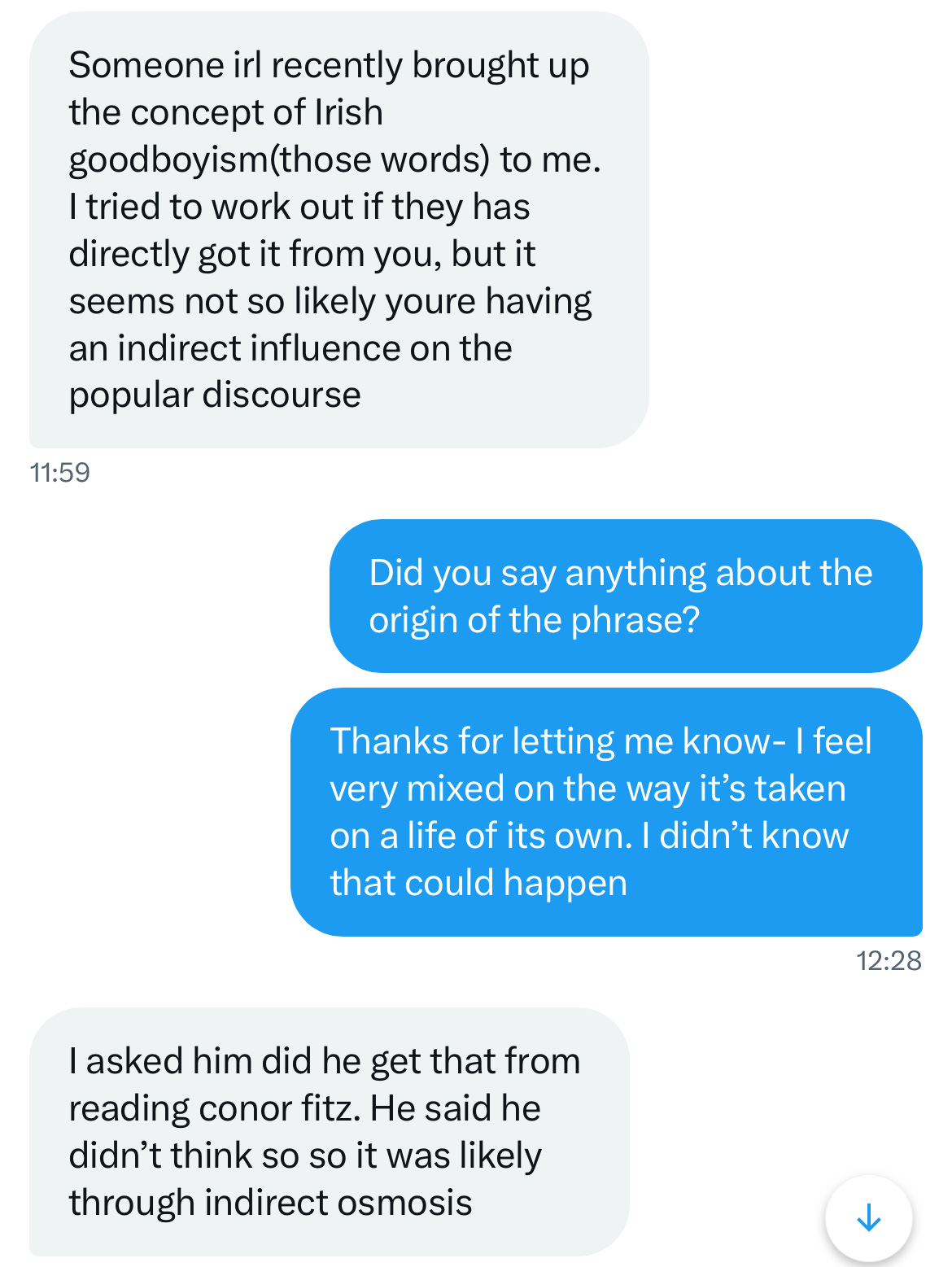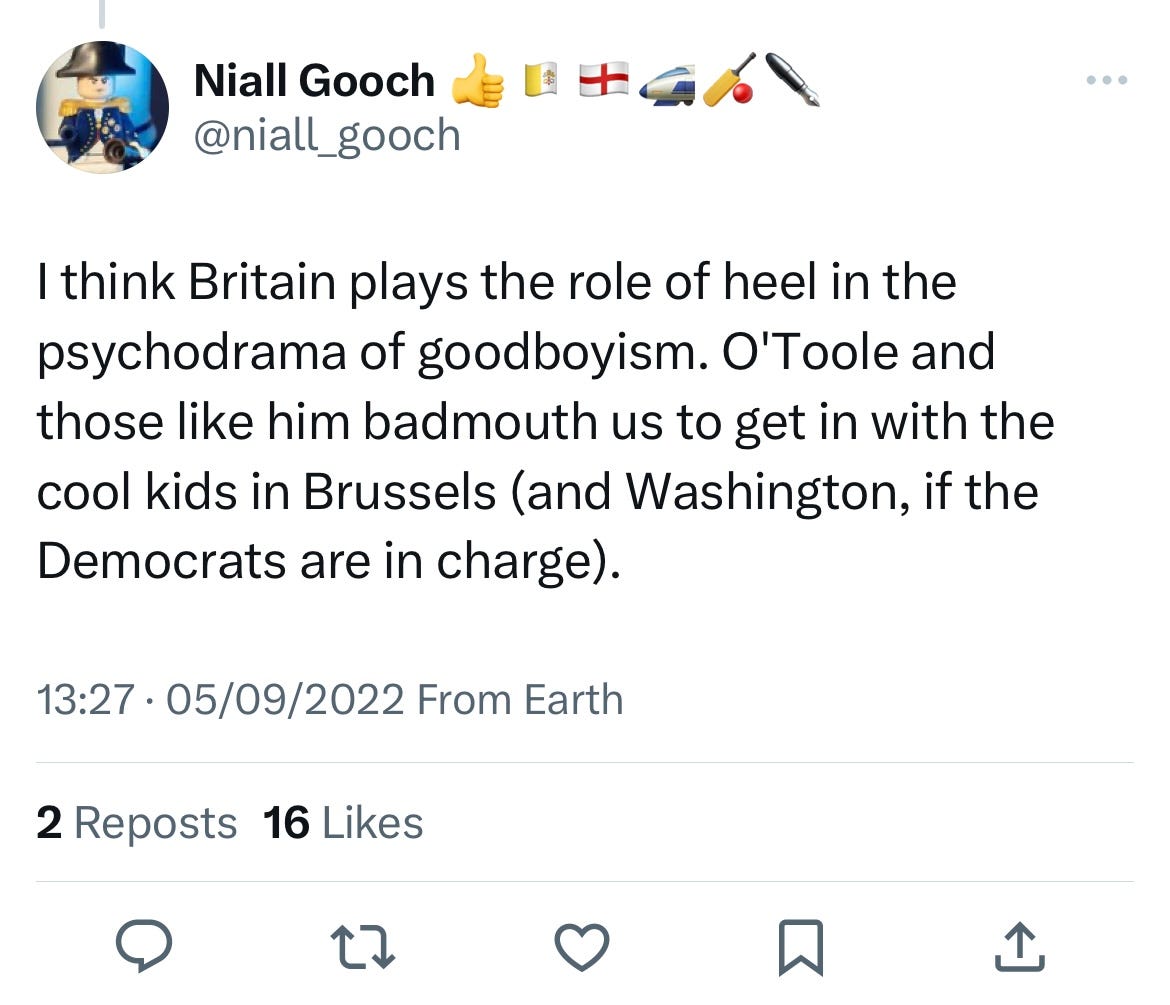Goodboyism Revisited
A couple of years ago I coined a phrase that took on a life of it's own
A couple of years ago I wrote an article called “Goodboyism: An Irish Political Neurosis”. The idea of the piece was that Irish politicians and cultural figures often direct their actions to external powers from whom they seek approval, regardless of how Irish people themselves might feel. This is done in a performative way and stems, I speculated, from an inferiority complex - an awareness that the Irish are marginal people and late arrivals to modernity. The phrase took on a life of it’s own and has worked its way into the political discourse, in a way I found strange and not always welcome.
Some quick examples of this below:
Phrase is used by Michael Brendan Dougherty in his National Review blog here; and by Ed West in his Substack here.
I occasionally get this type of DM from people, who have heard the use of the phrase in real life (I’m in blue here):
Couple of random examples from twitter:
You can find loads of other examples online. I’m painfully aware that this is all very low-stakes. But Ireland is a small market for political neologisms, particularly ones from an unfashionable perspective, so it means something.
The original article was written at the beginning of COVID and was strongly influenced by what was happening at that time. I wanted to write about how the concept has stood up in the interim, touching on what I got right and wrong, and a little bit about the experience of an idea you created taking on a life of its own.
On the positive side, the idea of Goodboyism has been vindicated by recent events in Ireland such as the political crisis related to hate speech laws. This issue had been bubbling away in the background with activists at national level struggling to raise issues around them and not getting anywhere in the face of our Cordon Sanitaire. I’m neither the most prescient nor the most influential on this, but even I was writing about it in 2019.
In classic Goodboy style, it was only when Elon Musk (an important person from a bigger country) became interested, and American media began asking questions, that the government started defending the law in a way that suggested there was something to debate. This was a two-pronged defence, perfectly aligned with Goodboy psychology. On one hand the entry of people like Musk and Donald Trump junior into the debate meant the chance for local politicians, media and activists to loudly trumpet our adherence to the right kind of ideals in the most self-satisfied way possible. But the fact the critiques were coming from people with international platforms meant that they couldn’t simply be ignored they way internal critiques could and that was a problem.
If the theory of Goodboyism is true the reaction of politicians to this attention would not be to merely justify these laws as worthwhile on their own terms, but that the support of these kind of reprobates is de facto proof that the laws are good and needed, and no other debates need to be had. That’s what happened. This kind of brainless self-satisfaction is Goodboyism in a nutshell.
The Ukraine crisis also happened after I’d written the original article and provided another example of Goodboyism in action. As Russia’s invasion commenced every country in EU rowed in behind Ukraine to some degree and it was never likely Ireland would do anything else. But the intensity of how we did it, with seemingly little regard for the predictable consequences, requires a psychological explanation. It was quickly clear that Ireland’s rulers were making a conscious decision to inflame our most grievous, intractable and long-standing societal issue (housing) irreversibly worse by many orders of magnitude overnight.
Ireland’s frenzied reaction brought an already simmering immigration crisis to the boil and can be seen as the with the government willing to take the exact steps for an incoming population in the international spotlight that they were never willing to take for their own people despite literal decades of begging. I wrote at the time “We finally have the complete reorientation of national political priorities onto this single issue that the country has been screaming for, for a decade - but it’s about Ukraine. How can that be?” Goodboyism provides at least part of the answer; the unique factor was the international visibility of the incoming population and the praiseworthiness of ostentatious support for their cause.
Once you describe an attitude (that is also kind of an insult) for the first time you start to see it everywhere. I noticed after writing that it's incredibly easy to make any outward-directed political behaviour you don’t like the symptom of a neurosis. I do have some mild regrets when I see it slapped on any event or tendency that people don’t like.
There are examples of where I think Goodboyism has been wrongly applied which includes Ireland’s relationship to the EU during Brexit. It’s true that during that time Irish politicians praised, leaned on and deferred to the EU, but it’s clear they were mostly doing so in pursuit of what they believed were our own national interests. Not every interaction with the EU unfolds that way but enough do that it’s clear Ireland’s swooning dedication to the EU is often cynical and instrumental, or to put it more tactfully, it has a practical basis. That’s especially true in Ireland where lots of people have (understandably, even if I sometimes disagree) decided the best way to pursue our national interest and exercise influence as a small country is to join a larger group and be the most dedicated advocate for its goals. Just because something happens at an intergovernmental level and involves players you don’t like doesn’t mean it’s Goodboyism.
The person who most needs to learn that lesson is me; like a lot of people I like spiritual and psychological explanations for things because they’re more interesting, and I often choose to de-emphasise the material ones, like the importance of population size and geographical marginality as limiting factors. It’s not that easy to develop a varied intellectual culture in a small country and sustain it - it’s easier to just import ideas which already have a seal of approval from someone successful. In numerically small and static societies it can cost people a lot to dissent from consensus so it tends to only change when it would be unsustainable, so people will sometimes cling frantically to those ideas or take them to unreasonable extremes.
None of these are arguments against Goodboyism per se, but an indication that the neurosis itself is built on something.
My own Goodboyism is I often feel like shit when I reflect on the article because people read it as painting Irish culture as somehow inadequate, which isn’t what I think - at least no more so than anywhere else. That gives me some insight into the idea of Goodboyism, it’s persistence, and why consensus is such a powerful tool. Smallness and marginality aren’t just oppressive phantasms but real factors that people are aware of and want to account for. We’re all small and marginal over here and we have to look after each other in the best way we can because of that. If you’re reading this you’re almost certainly someone who spends a decent amount of time on twitter; everyone who does that has a particle of the Goodboy bacteria in them because you spend all your time performing your fidelity to a small group, and losing approval of that group is painful.
The fact that the phrase boomerangs back at me is disconcerting but an indication that it captured something accurate, and scratched an itch that many people couldn’t scratch themselves and maybe didn’t even know they had. The last 12 months in Ireland have proven the idea correct. Every time I feel like coining the term was a mistake something happens to make me feel like my instincts were right, which is great, because after all as Gore Vidal once said - the sweetest words in the english language are not "I love you", but “told you so”.








Goodboyism can be interpreted as Pathological Altruism ,where the natives are willing to suffer their own demise to advance a virtue signalling impression to receive a 'pat on the head'.
It is an addictive and suicidal mental disease, leading to social chaos and destruction.
Ireland appears to be particularly affected, as we have seen with the Covid Hoax, the Russophobic affair and the Palestinian genocide case .
The causes are a population that is parochial in its outlook, innocent ,naive ,trusting of authority, and easily manipulated and exploited by a cynical ,vicious controlled Media, without the availability of alternative opposing views.
That picture is effin' priceless.